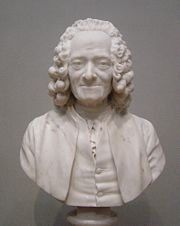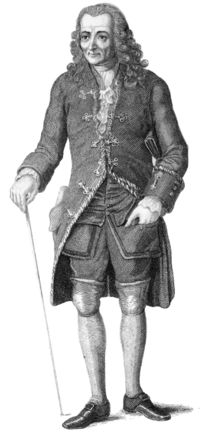Voltaire
2008/9 Schools Wikipedia Selection. Related subjects: Writers and critics
| François-Marie Arouet | |
|---|---|
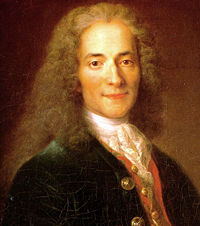 Voltaire at 24, by Nicolas de Largillière. |
|
| Born | 21 November 1694 Paris, France |
| Died | May 30, 1778 (aged 83) Paris, France |
| Pen name | Voltaire |
| Occupation | Philosopher |
| Nationality | French |
|
Influences
|
|
|
Influenced
|
|
François-Marie Arouet ( 21 November 1694 – 30 May 1778), better known by the pen name Voltaire, was a French Enlightenment writer, essayist, deist and philosopher known for his wit, philosophical sport, and defense of civil liberties, including freedom of religion and free trade.
Voltaire was a prolific writer, and produced works in almost every literary form, authoring plays, poetry, novels, essays, historical and scientific works, over 20,000 letters and over two thousand books and pamphlets.
He was an outspoken supporter of social reform despite strict censorship laws and harsh penalties for those who broke them. A satirical polemicist, he frequently made use of his works to criticize Catholic Church dogma and the French institutions of his day.
Voltaire was one of several Enlightenment figures (along with John Locke and Thomas Hobbes) whose works and ideas influenced important thinkers of both the American and French Revolutions.
Early career
François-Marie Arouet was born in Paris, the youngest of the five children of François Arouet (1650–1 January 1722), a notary who was a minor treasury official, and his wife, Marie Marguerite d'Aumart (ca. 1660–13 July 1701), from a noble family of Poitou province. Voltaire was educated by Jesuits at the Collège Louis-le-Grand (1704-11), where he learned Latin and Greek; later in life he became fluent in Italian, Spanish, and English.
By the time he left college, Voltaire had decided he wanted to become a writer - however, his father wanted him to become a lawyer. Voltaire, pretending to work in Paris as an assistant to a lawyer, spent much of his time writing satirical poetry. When his father found him out, he sent Voltaire to study law, this time in the provinces. Nevertheless, he continued to write, producing essays and historical studies not always noted for their accuracy. Voltaire's wit made him popular among some of the aristocratic families he mixed with. Voltaire's father then obtained a job for him as a secretary to the French ambassador in the Netherlands, where Voltaire fell in love with a French refugee named Catherine Olympe Dunoyer. Their scandalous elopement was foiled by Voltaire's father and he was forced to return to France.
Most of Voltaire's early life revolved around Paris. From early on, Voltaire had trouble with the authorities for his energetic attacks on the government and the Catholic Church. These activities were to result in numerous imprisonments and exiles. In 1717, in his early twenties, he became involved in the Cellamare conspiracy of Giulio Alberoni against Philippe II, Duke of Orléans, the regent for Louis XV of France. He allegedly wrote satirical verses about the aristocracy and one of his writings about the Régent led to him being imprisoned in the Bastille for eleven months. While there, he wrote his debut play, Œdipe. Its success established his reputation.
The name "Voltaire"
The name "Voltaire," which the author adopted in 1718 both as a pen name and for daily use, is an anagram of "AROVET LI," the Latinized spelling of his surname, Arouet, and the initial letters of the sobriquet "le jeune" ("the younger"). The name also echoes in reverse order the syllables of the name of a family château in the Poitou region: " Airvault". The adoption of the name "Voltaire" following his incarceration at the Bastille is seen by many to mark Voltaire's formal separation from his family and his past.
Richard Holmes supports this derivation of the name, but adds that a writer such as Voltaire would have intended it to also convey its connotations of speed and daring. These come from associations with words such as "voltige" ( acrobatics on a trapeze or horse), " volte-face" (a spinning about to face one's enemies), and "volatile" (originally, any winged creature). "Arouet" was not a noble name fit for his growing reputation, especially given that name's resonance with "à rouer" ("for thrashing") and "roué" (a "debauchee").
Poetry
From an early age, Voltaire displayed a talent for writing verse, and his first published work was poetry. He wrote two long poems, the Henriade, and La Pucelle d'Orléans, besides many other smaller pieces.
The Henriade was written in imitation of Virgil, using the Alexandrine couplet reformed and rendered monotonous for dramatic purposes. Voltaire lacked enthusiasm for and understanding of the subject, both of which negatively affected the poem's quality. The Pucelle, on the other hand, is a burlesque work attacking religion and history. Voltaire's minor poems are generally considered superior to either of these two works.
Prose
Many of Voltaire's prose works and romances, usually composed as pamphlets, were written as polemics. Candide attacks religious and philosophical optimism; L'Homme aux quarante ecus, certain social and political ways of the time; Zadig and others, the received forms of moral and metaphysical orthodoxy; and some were written to deride the Bible. In these works, Voltaire's ironic style, free of exaggeration, is apparent, particularly the restraint and simplicity of the verbal treatment. Candide in particular is the best example of his style.
Voltaire also has, in common with Jonathan Swift, the distinction of paving the way for science fiction's philosophical irony, particularly in his Micromégas.
In general criticism and miscellaneous writing, Voltaire's writing was comparable to his other works. Almost all of his more substantive works, whether in verse or prose, are preceded by prefaces of one sort or another, which are models of his caustic yet conversational tone. In a vast variety of nondescript pamphlets and writings, he displays his skills at journalism. In pure literary criticism his principal work is the Commentaire sur Corneille, although he wrote many more similar works — sometimes (as in his Life and notices of Molière) independently and sometimes as part of his Siécles.
Voltaire's works, especially his private letters, frequently contain the word "l'infâme" and the expression "écrasez l'infâme, or "crush the infamy". The phrase refers to abuses of the people by royalty and the clergy that Voltaire saw around him, and the superstition and intolerance that the clergy bred within the people. He had felt these effects in his own exiles, in the confiscations of his books, and the hideous sufferings of Calas and La Barre.
The most oft-cited Voltaire quotation is apocryphal. He is incorrectly credited with the quote "I disapprove of what you say, but I will defend to the death your right to say it." These were not his words but instead were written by Evelyn Beatrice Hall - under the pseudonym S. G. Tallentyre - in her 1906 biographical book The Friends of Voltaire. Hall intended to summarize in her own words Voltaire's attitude towards Claude Adrien Helvétius and his controversial book De l'esprit, but her first-person expression was mistaken for an actual quotation from Voltaire. Her interpretation does capture the spirit of Voltaire's attitude towards Helvetius; it had been said Hall's summary was inspired by a quotation found in a 1770 Voltaire letter to an Abbot le Roche, in which he was reported to have said, "I detest what you write, but I would give my life to make it possible for you to continue to write." Nevertheless, scholars believe there must have again been misinterpretation, as the letter does not seem to contain any such quote. Voltaire's largest philosophical work is the Dictionnaire philosophique, comprising articles contributed by him to the Encyclopédie and several minor pieces. It directed criticism at French political institutions, Voltaire's personal enemies, the Bible, and the Roman Catholic Church.
Amongst other targets, Voltaire was a critic of France's colonial policy in North America, dismissing the vast territory of New France as " a few acres of snow" ("quelques arpents de neige").
Letters
Voltaire also engaged in an enormous amount of private correspondence during his life, totaling over 21,000 letters. His personality shows through in the letters that he wrote: his energy and versatility, his unhesitating flattery, his ruthless sarcasm, his unscrupulous business faculty, and his resolve to double and twist in any fashion so as to escape his enemies.
England
Voltaire's repartee continued to get him into trouble. After he offended a young nobleman, the Chevalier de Rohan, the Rohan family had a lettre de cachet issued, a secret warrant that allowed for the punishment of people who had committed no crimes or who possibly posed a risk to the royal family, and used it to exile Voltaire without a trial. The incident marked the beginning of Voltaire's attempt to improve the French judiciary system.
Voltaire's exile to England greatly influenced him through ideas and experiences. The young man was impressed by Britain's constitutional monarchy, as well as the country's support of the freedoms of speech and religion. He was influenced by several of the neoclassical writers of the age, and developed an interest in earlier English literature, especially in the works of Shakespeare, still little known in continental Europe at the time. Despite pointing out his deviations from neoclassical standards, Voltaire saw Shakespeare as an example French writers might look up to, since drama in France, despite being more polished, lacked on-stage action. Later, however, as Shakespeare's influence was being increasingly felt in France, Voltaire would endeavour to set a contrary example with his own plays, decrying what he considered Shakespeare's barbarities.
After three years in exile, Voltaire returned to Paris and published his views on British attitudes towards government, literature and religion in a collection of essays in letter form entitled the Lettres philosophiques sur les Anglais (Philosophical letters on the English). Because he regarded the British constitutional monarchy as more developed and more respectful of human rights (particularly religious tolerance) than its French counterpart, these letters met great controversy in France, to the point where copies of the document were burnt and Voltaire was again forced to leave France.
Cirey
Voltaire's next destination was the Château de Cirey, located on the borders of Champagne, France and Lorraine. The building was renovated with his money, and here he began a relationship with the Marquise du Châtelet, Gabrielle Émilie le Tonnelier de Breteuil. Cirey was owned by the Marquise's husband, Marquis Florent-Claude du Chatelet, who sometimes visited his wife and her lover at the chateau. The relationship, which lasted for fifteen years, had a significant intellectual element. Voltaire and the Marquise collected over 21,000 books, an enormous number for the time. Together, they studied these books and performed experiments in the " natural sciences" in his laboratory. Voltaire's experiments included an attempt to determine the properties of fire.
Having learned from his previous brushes with the authorities, Voltaire began his future habit of keeping out of personal harm's way, and denying any awkward responsibility. He continued to write, publishing plays such as Mérope and some short stories. Again, a main source of inspiration for Voltaire were the years of his British exile, during which he had been strongly influenced by the works of Sir Isaac Newton. Voltaire strongly believed in Newton's theories, especially concerning optics (Newton’s discovery that white light is composed of all the colors in the spectrum led to many experiments at Cirey), and gravity (the story of Newton and the apple falling from the tree is mentioned in Voltaire's Essai sur la poésie épique, or Essay on Epic Poetry). Although both Voltaire and the Marquise were curious about the philosophies of Gottfried Leibniz, a contemporary and rival of Newton, they remained "Newtonians" and based their theories on Newton’s works and ideas. Though it has been stated that the Marquise may have been more "Leibnizian", she did write "je newtonise," which, translated, means "I am 'newtoning'". Voltaire's book, Eléments de la philosophie de Newton (The Elements of Newton's Philosophies), was probably co-written with the Marquise, and describes the other branches of Newton's ideas that fascinated him, including optics and the theory of attraction (gravity).
Voltaire and the Marquise also studied history - particularly the people who had contributed to civilization up to that point. Voltaire's second essay in English had been Essay upon the Civil Wars in France. When he returned to France, he wrote a biographical essay of King Charles XII, which marks the beginning of Voltaire's rejection of religion; he wrote that human life is not destined or controlled by greater beings. The essay won him the position of historian in the king's court. Voltaire and the Marquise also worked with philosophy, particularly with metaphysics, the branch of philosophy dealing with the distant, and what cannot be directly proven: why and what life is, whether or not there is a God, and so on. Voltaire and the Marquise analyzed the Bible, trying to find its validity in the world. Voltaire renounced religion; he believed in the separation of church and state and in religious freedom, ideas he formed after his stay in England. Voltaire even claimed that "One hundred years from my day there will not be a Bible in the earth except one that is looked upon by an antiquarian curiosity seeker."
Later life
After the death of the Marquise, Voltaire moved to Berlin to join Frederick the Great, a close friend and admirer of his. The king had repeatedly invited him to his palace, and now gave him a salary of 20,000 francs a year. Though life went well at first, he began to encounter difficulties. Faced with a lawsuit and an argument with the president of the Berlin Academy of science, Voltaire wrote the Diatribe du docteur Akakia (Diatribe of Doctor Akakia) which derided the president. This greatly angered Frederick, who had all copies of the document burned and arrested Voltaire at an inn where he was staying along his journey home. Voltaire headed toward Paris, but Louis XV banned him from the city, so instead he turned to Geneva, where he bought a large estate. Though he was received openly at first, the law in Geneva which banned theatrical performances and the publication of La pucelle d'Orléans against his will led to Voltaire's writing of Candide, ou l'Optimisme (Candide, or Optimism) in 1759 and his eventual departure. Candide, a satire on the philosophy of Leibniz, remains the work for which Voltaire is perhaps best known.
It is said that he said at his deathbed, "I am abandoned by God and man." Voltaire died on 30 May 1778 and his last words are said to have been, "For God's sake, let me die in peace."
Religion
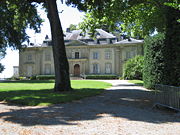
Voltaire, though often thought an atheist, did in fact partake in religious activities and even erected a chapel on his estate at Ferney. The chief source for the misconception is a line from one of his poems (called "Epistle to the author of the book, The Three Impostors") that translates to: "If God did not exist, it would be necessary to invent Him." The full body of the work, however, reveals his criticism was more focused towards the actions of organized religion, rather than with the concept of religion itself.
Like many other key figures during the European Enlightenment, Voltaire considered himself a Deist. He did not believe that absolute faith, based upon any particular or singular religious text or tradition of revelation, was needed to believe in God. In fact, Voltaire's focus instead on the idea of a universe based on reason and a respect for nature reflected the contemporary Pantheism, increasingly popular throughout the seventeenth and eighteenth centuries and which continues in a form of deism today known as "Voltairean Pantheism."
He wrote, "What is faith? Is it to believe that which is evident? No. It is perfectly evident to my mind that there exists a necessary, eternal, supreme, and intelligent being. This is no matter of faith, but of reason."
In terms of religious texts, Voltaire was largely of the opinion that the Bible was 1) an outdated legal and/or moral reference, 2) by and large a metaphor, but one that still taught some good lessons, and 3) a work of Man, not a divine gift. These beliefs did not hinder his religious practice, however, though it did gain him somewhat of a bad reputation in the Catholic Church. It may be noted that Voltaire was indeed seen as somewhat of a nuisance to many believers, and was almost universally known; Wolfgang Amadeus Mozart wrote to his father the year of Voltaire's death, saying, "The arch-scoundrel Voltaire has finally kicked the bucket...."
Voltaire was also critical of Muhammad. His play Fanaticism, or Mahomet was “written in opposition to the founder of a false and barbarous sect”; he also referred to Muhammad as “a false prophet.” However, his views on Islam were more favourable. He called him the founder of "a wise, severe, chaste, and humane religion", and also said "The legislator of the Muslims, a terrible and powerful man, established his dogmas with his valor and arms; yet, his religion became benign and tolerant."
From translated works on Confucianism and Legalism, Voltaire drew on Chinese concepts of politics and philosophy - which were based on rational principles, to look critically at European organized religion and hereditary aristocracy.
Voltaire also displayed, as part of his Dictionnaire philosophique, an inclination towards the ideas of Hinduism and the works of Brahmin priests, asking, "Is it not probable that the Brahmins were the first legislators of the earth, the first philosophers, the first theologians?" His attitudes towards religious institutions are further shown in the criticisms he made of Christian missionaries in India.
There is an apocryphal story that his home at Ferney was purchased by the Geneva Bible Society and used for printing Bibles, but this appears to be due to a misunderstanding of the 1849 annual report of the American Bible Society. Voltaire's chateau is now owned and administered by the French Ministry of Culture.
Freemasonry
Voltaire was initiated into Freemasonry two months before his death. On 7 April 1778 Voltaire accompanied Benjamin Franklin into Loge des Neuf Soeurs in Paris, France and became an Entered Apprentice Freemason.
Legacy
Voltaire perceived the French bourgeoisie to be too small and ineffective, the aristocracy to be parasitic and corrupt, the commoners as ignorant and superstitious, and the church as a static force useful only as a counterbalance since its "religious tax" or the tithe helped to create a strong backing for revolutionaries.
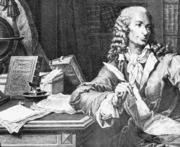
Voltaire distrusted democracy, which he saw as propagating the idiocy of the masses. To Voltaire, only an enlightened monarch or an enlightened absolutist, advised by philosophers like himself, could bring about change as it was in the king's rational interest to improve the power and wealth of his subjects and kingdom. Voltaire essentially believed enlightened despotism to be the key to progress and change.
The most enduring of Voltaire's written works is his novella, Candide, ou l'Optimisme (Candide, or Optimism, 1759), which satirized the philosophy of optimism. Candide was also subject to censorship and Voltaire jokingly claimed the actual author was a certain "Demad" in a letter, where he reaffirmed the main polemical stances of the text.
Voltaire is also known for many memorable aphorisms, such as: "Si Dieu n'existait pas, il faudrait l'inventer" ("If God did not exist, it would be necessary to invent him"), contained in a verse epistle from 1768, addressed to the anonymous author of a controversial work, The Three Impostors.
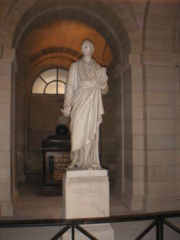
Voltaire is remembered and honored in France as a courageous polemicist who indefatigably fought for civil rights — the right to a fair trial and freedom of religion — and who denounced the hypocrisies and injustices of the ancien régime. The ancien régime involved an unfair balance of power and taxes between the First Estate (the clergy), the Second Estate (the nobles), and the Third Estate (the commoners and middle class, who were burdened with most of the taxes).
Thomas Carlyle argued that, while Voltaire was unsurpassed in literary form, not even the most elaborate of his works were of much value for matter and that he never uttered an original idea of his own.
His views of non-western peoples was ambiguous. While he often used China, Siam and Japan as examples of brilliant non-European civilizations and harshly criticized slavery , he also believed that Africans were a separate species, inferior to the Europeans, and that ancient Jews were "an ignorant and barbarous people."
The town of Ferney, France, where Voltaire lived out the last 20 years of his life (though he died in Paris), is now named Ferney-Voltaire in honour of its most famous resident. His château is a museum.
Voltaire's library is preserved intact in the Russian National Library at St. Petersburg, Russia.
In 1791 Voltaire's remains were entombed at Paris' Panthéon.
According to poet Richard Armour, Voltaire's friendship with Frederick William existed because "Frederick considered Voltaire to be immensely clever and so did Voltaire."
The Scots diarist James Boswell befriended Voltaire after meeting him at Ferney in 1764. Boswell recorded their conversations, which are published in Boswell and the Grand Tour and give an interesting insight into Voltaire.
